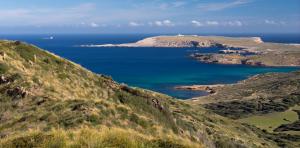
Grants
Sea
OBSAM | Vulnerable Fish Study – Phase 3
€8,720.00 awarded
Organisation requesting funding:
OBSAM – Menorca’s Socio-environmental Observatory.
Issue of Concern being addressed:
Increasing knowledge of fish populations vulnerable to fishing.
Project Overview:
In the year 2000, OBSAM created the “Follow-up Network for Menorca’s Marine wildlife” which offered support and research for projects aiming at improving the knowledge and management of Menorca as a Biosphere Reserve. One of the projects within this network was the constant monitoring of fish populations vulnerable to fishing in Menorca’s coastal waters. However, due to the financial crisis, these studies were all stopped in 2011.
The MEPF was key in starting these studies again in 2018 and have co-funded this research with OBSAM during 2018 and 2019, along with participation from the Institute Jaume Ferrer who represents the Spanish oceanographic institute on Menorca. In addition, in 2019 the three organisations involved carried out three presentations across Menorca to present the results of the studies we were supporting. The fish study presentation was a resounding success sparking important conversation between the fishing sector, the local government and private organisations involved in the sector.
In addition, the study areas were amended to include the Isla del Aire which in the meantime has been declared a Marine protected area – meaning that thank you to the research funded already – and if we support this study once again – we would have data on fish populations in the marine protected area in the south of Menorca – both before the MPA declaration – during it and 1 year after the declaration. The total is 12 stations – 4 within each MPA and 2 on the outskirts of each MPA.
Project collaborations:
OBSAM is working with the Estación Jaume Ferrer (marine research centre on Menorca), the Biosphere Reserve agency, Institut Balear de Natura (IBANAT), the Balearic government, and the S’albufera Natural Park.
General project objective:
The fish species vulnerable to fishing on Menorca’s coast have suffered constant over-exploitation from the fishing community (both professional and recreational).
Therefore, this project aims to continue to update and assess the state of conservation of the populations of fish vulnerable to fishing, in the Natural Parc of S’albufera d’es Grau, on the north coast, and the Isla del Aire on the south coast with the objective of informing decisions made with regards to the protection of these areas and look at strategies for more sustainable fishing.
The main objective for the 2020 campaign has been defined: to convert the project into a monitoring reference in two very specific areas in which there is a different fisheries management system: The Marine Reserve of the Island of the Air (RMIA) and the Natural Park of s’Albufera des Grau (PNAG).
The projects specific objectives are:
- Apart from the main objective of the project, the specific objectives that were set in the 2018 project have been maintained and two more objectives are added:
- Repeat the sampling of fish populations vulnerable to fishing in the marine area of the Natural Park of s’Albufera des Grau and the Marine Reserve of the Isla del Aire.
- Assess the status of fish stocks after one year since the approval of the Marine Reserve of the Isla del Aire.
- Assess the status of the fish stocks of the PNAG before the approval of the PRUG (network of national parks) and support the need for its approval.
- Consolidate the reactivation of the OBSAM Marine Environment Monitoring Network of Menorca, initiated in 2000 and interrupted in 2011.
- Consolidate the collaboration with the different entities and administrations of the island of Menorca involved in marine management and favor the exchange of information with the Ministry for Fisheries and Marine Environment.
- Assess the degree of fishing pressure on fish communities associated with rocky bottoms through visual censuses.
- Identification of environmental impacts, threats or problems and detection of invasive species (fish, algae or invertebrates).
- Expand historical data series to determine future trends.
- Characterize each of the sampling stations.
- Analyze the location of the sampling stations and assess the inclusion of deep stations in the Isla del Aire.
Project phases:
- Preparation for the field research
- Field research
- Data analysis
Chronology:
March 2020 to December 2020 with dives taking place from May to July – weather and government guidelines in regards to COVID-19 permitting.